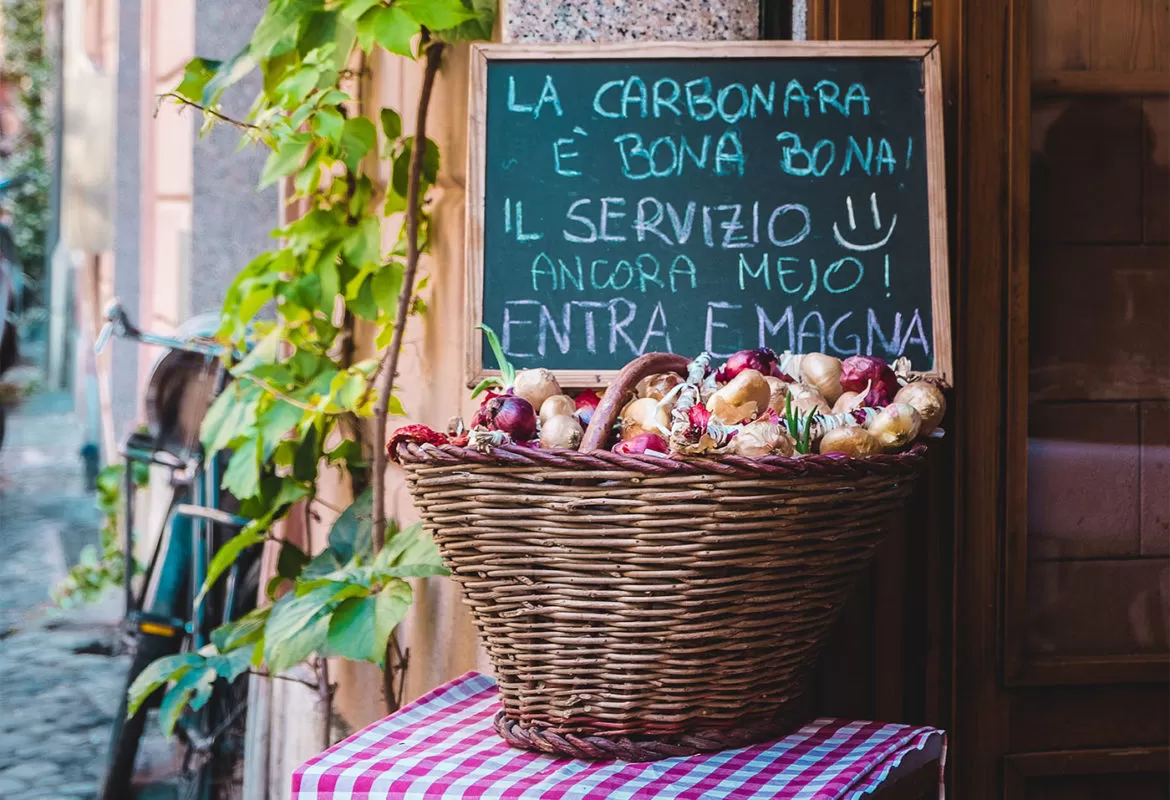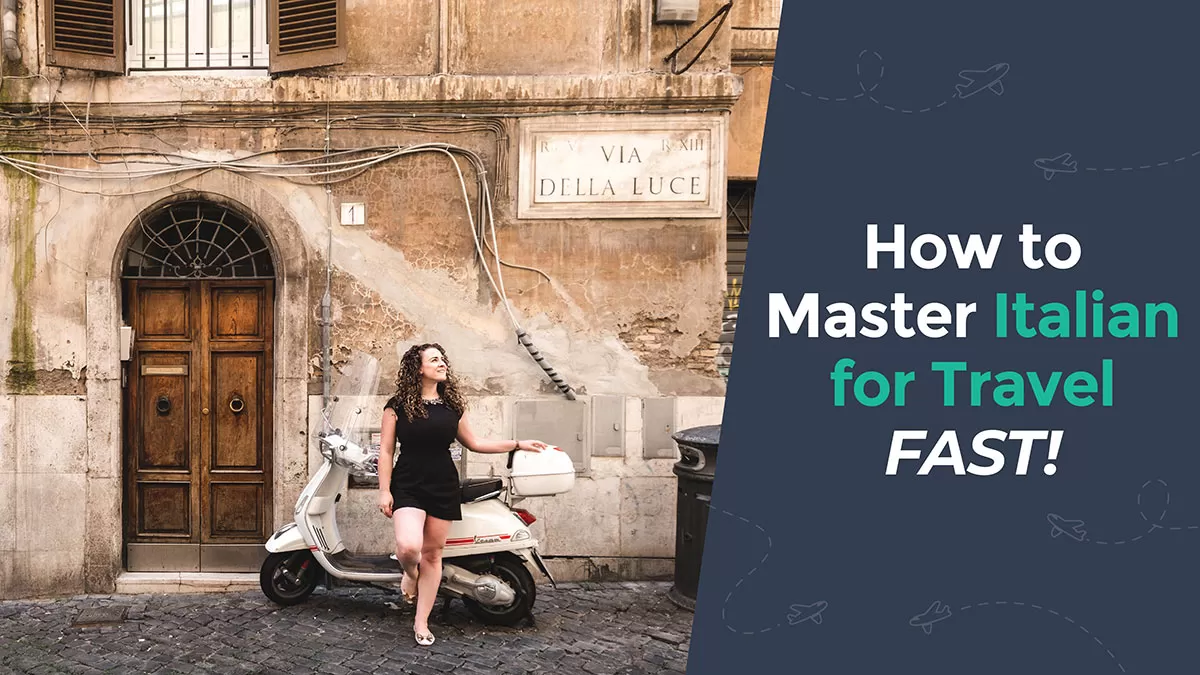When in Rome, do as the Romans do…speak Romanesco! Blend in as you brush up on these common Roman dialect words and phrases so next time you’re in Rome, you’ll be speaking like a Roman! Impress the locals with these colourful Roman dialect words.
‘But, where are you from?.. you have a Roman accent’.
As an Australian speaking Italian, I am always conscious of my lazy anglo saxon tongue butchering the beautifully melodic Italian language.
Somehow in the three years of living in Rome, I managed to pick up a Roman accent, according to some Italians. Woohoo! I was chuffed when they said I sounded like a Roman.
For some, the Roman accent and dialect for that matter, isn’t very appealing. In fact, the famous Italian Poet Dante Alighieri said that it was worse than a ‘vulgar tongue’, but was infact ‘profanity’. Tough crowd.
It might sound brutto (ugly) to Dante, but I am proud that the city I love so much has left its mark on my now Italian speaking tongue.
To be clear, I don’t speak the Roman dialect, (called ‘Romanesco’ and spoken primarily in Rome) but a few typically Roman phrases have crept into my vocabulary along with the intonation and inflection of the dialect.
As a side note, those who dislike ‘Romanesco’ call it ‘Romanaccio’ since the use of the suffix ‘accio’ carries negative connotations.
If you speak a reasonable amount of standard Italian, you’ll appreciate and enjoy this guide to the most commonly used words and phrases in the Roman dialect.
Personally, I think Romanesco has a beauty to it. Whenever I hear it, it makes me either smile or laugh, which can only be a good thing. Maybe it’s because the insults are so wonderfully creative.
Roman Dialect Pronunciation
As a general rule, drop any vowels at the start of a word and double any consonants.
For example, articles such as un, uno and una lose the ‘u’ and become ‘n, ‘no and ‘na. Words with double consonants like ‘buono’ and ‘buona’ become ‘bonno’ or ‘bonna’.
Another rule of thumb to follow is that when the letter ‘l’ is followed by a consonant, it’s pronounced ‘r’. Wouldn’t we all love to to live ‘la dorce vita’.
This idea of shortening verbs is a common characteristic in Romanesco. Romans will often drop the endings of words, so ‘andiamo a mangiare’ (let’s go to get something to eat) becomes ‘annamo a magnà’.
Consonant groups such as ‘nd’ are often merged into double consonants in Romanesco. If you repeat ‘andiamo’ multiple times you’ll see how this rule came about.
25 Typical Roman Words and Phrases
Want to hear the pronunciation? Watch the video here!
1. Aò! – Hello
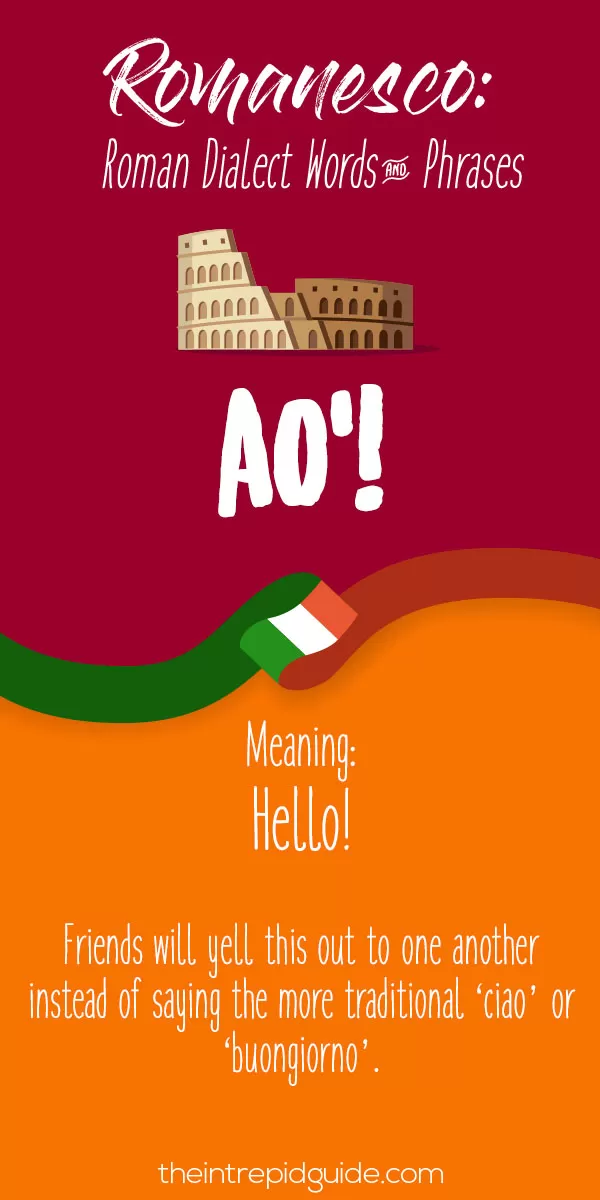 If nothing else, you have to remember the iconic Roman greeting, ‘Aò’. Friends will yell this out to one another instead of saying the more traditional ‘ciao’ or ‘buongiorno’. But its use doesn’t end there, aò is also used as an exclamation, added to either the start or the end of a sentence for emphasis.
If nothing else, you have to remember the iconic Roman greeting, ‘Aò’. Friends will yell this out to one another instead of saying the more traditional ‘ciao’ or ‘buongiorno’. But its use doesn’t end there, aò is also used as an exclamation, added to either the start or the end of a sentence for emphasis.
Another way of saying hello is simply saying ‘bella!’ with either ‘aò’ directly after it or on its own. But don’t worry, the use of the word ‘bella’ in this context has a different meaning from the adjective ‘bella’ (beautiful), people won’t think you’re hitting on them. When Romans think someone is good-looking they describe them as being ‘bono’ or ‘bona’ from buono and / buona, which in standard Italian is never used this way.
2. Come te butta? – How’s it going?
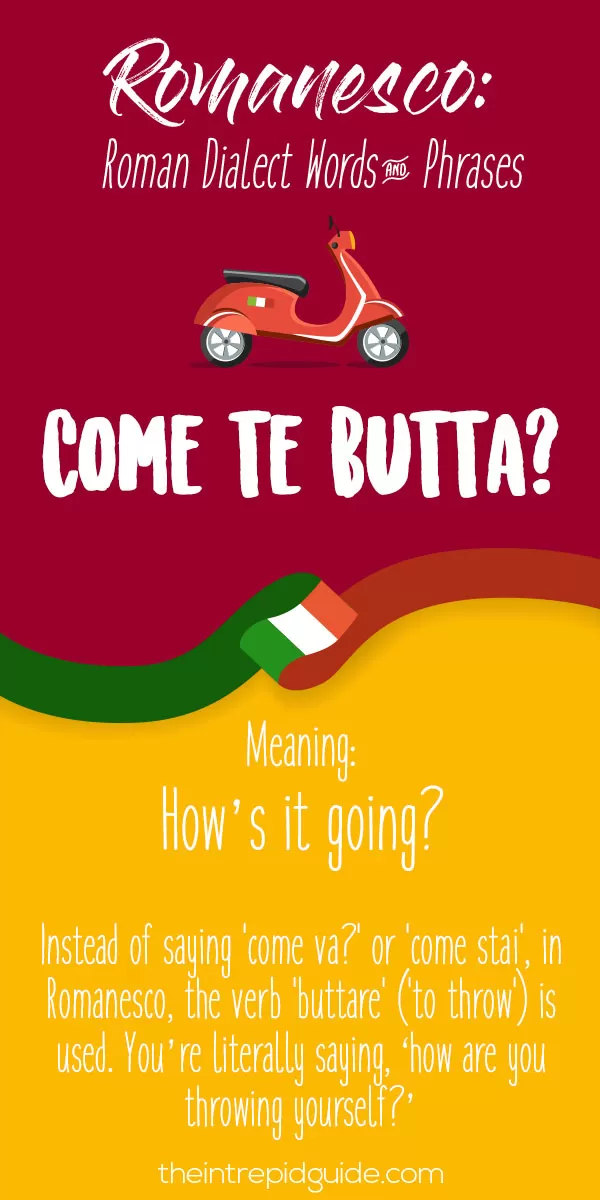 Once you’ve said hello, now you need to ask how your Romans friends are doing. Come te butta is the perfect example of making a boring phrase more interesting. In Standard Italian, you would say either ‘come va’ (how’s it going?) or ‘come stai’ (how are you?), but in Romanesco, the verb ‘buttare’ (meaning ‘to throw’) is used. So you’re literally saying, ‘how are you throwing yourself?’ And note, that ‘te’ isn’t a typo, it the typical Roman pronunciation.
Once you’ve said hello, now you need to ask how your Romans friends are doing. Come te butta is the perfect example of making a boring phrase more interesting. In Standard Italian, you would say either ‘come va’ (how’s it going?) or ‘come stai’ (how are you?), but in Romanesco, the verb ‘buttare’ (meaning ‘to throw’) is used. So you’re literally saying, ‘how are you throwing yourself?’ And note, that ‘te’ isn’t a typo, it the typical Roman pronunciation.
3. Avoja! – Sure! Hell yeah!
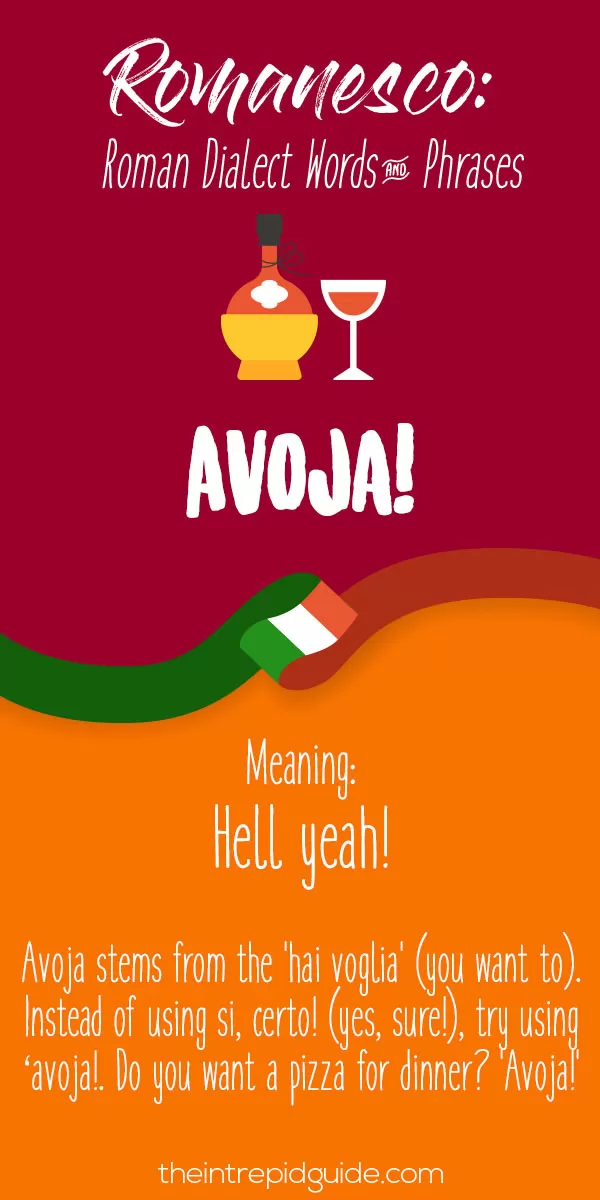 This is the first time we see the use of the letter ‘j’ which isn’t a letter in the standard Italian alphabet and only seen in foreign loan words like jogging and yoga. It sounds like a the Italian ‘gl’ sound but softer. Avoja stems from the ‘hai voglia’ (you want to) but can also be written ‘avoia’. Instead of simply using sì, certo! (yes, sure!), try using ‘avoja!’ which can only really be translated to hell yeh! Do you want a pizza for dinner? ‘Avoja!’
This is the first time we see the use of the letter ‘j’ which isn’t a letter in the standard Italian alphabet and only seen in foreign loan words like jogging and yoga. It sounds like a the Italian ‘gl’ sound but softer. Avoja stems from the ‘hai voglia’ (you want to) but can also be written ‘avoia’. Instead of simply using sì, certo! (yes, sure!), try using ‘avoja!’ which can only really be translated to hell yeh! Do you want a pizza for dinner? ‘Avoja!’
4. Ammazza! – Wow!
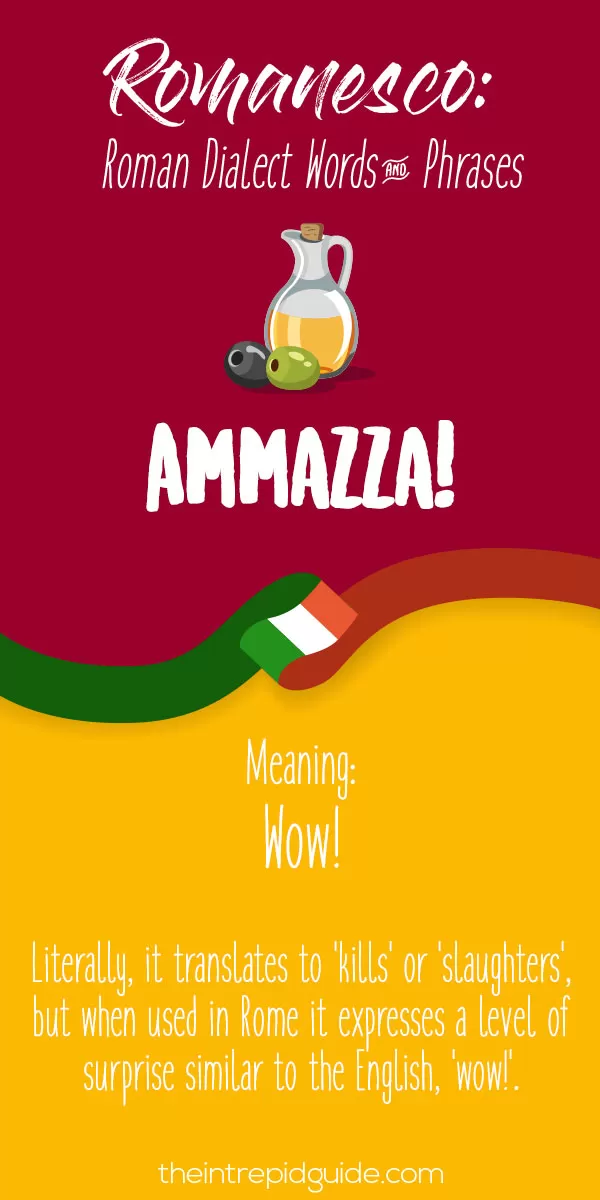 This one makes me smile and is possibly my favourite Roman word. Literally, it translates to ‘kills’ or ‘slaughters’, but when used in Rome it expresses a level of surprise similar to the English, ‘wow!’. Ammazza can even be used to show disappointment, in which case you’ll know which one depending on the conversation. A perfect addition to this is adding an ‘aò’ at the end. Look, there’s the Colosseum! Ammazza aò!
This one makes me smile and is possibly my favourite Roman word. Literally, it translates to ‘kills’ or ‘slaughters’, but when used in Rome it expresses a level of surprise similar to the English, ‘wow!’. Ammazza can even be used to show disappointment, in which case you’ll know which one depending on the conversation. A perfect addition to this is adding an ‘aò’ at the end. Look, there’s the Colosseum! Ammazza aò!
5. Daje! – Come on!
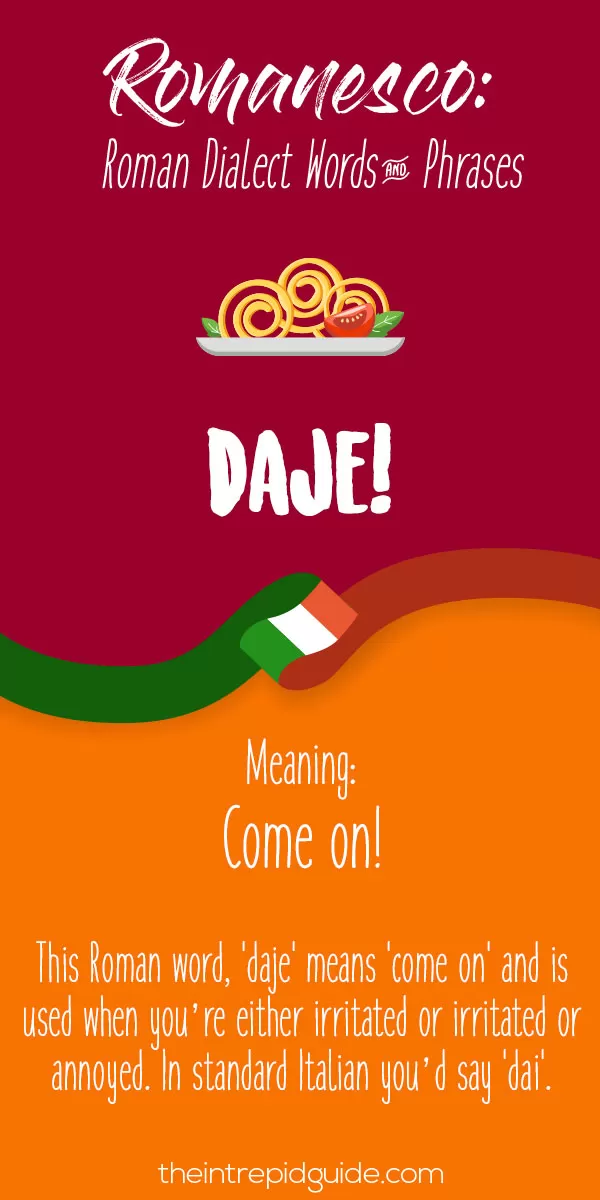 Another versatile Roman word, ‘daje’ means ‘come on’ and is used when you’re either irritated or irritated or annoyed. In standard Italian you’d say ‘dai’. The key to using ‘daje’ is all in its long drawn out pronunciation. It sounds something like ‘ehdaaayeh!’.
Another versatile Roman word, ‘daje’ means ‘come on’ and is used when you’re either irritated or irritated or annoyed. In standard Italian you’d say ‘dai’. The key to using ‘daje’ is all in its long drawn out pronunciation. It sounds something like ‘ehdaaayeh!’.
As we’ve seen with previous words, ‘daje’ can also be used in the positive way to encourage or motivate someone or your favourite team. If you go to a AS Roma game, you can support them with a ‘daje Roma!’ (‘come on Roma!’ ) Daje Roma facci un gol!’ (Come on Roma, Score us a goal!)
6. Da paura! – Awesome!
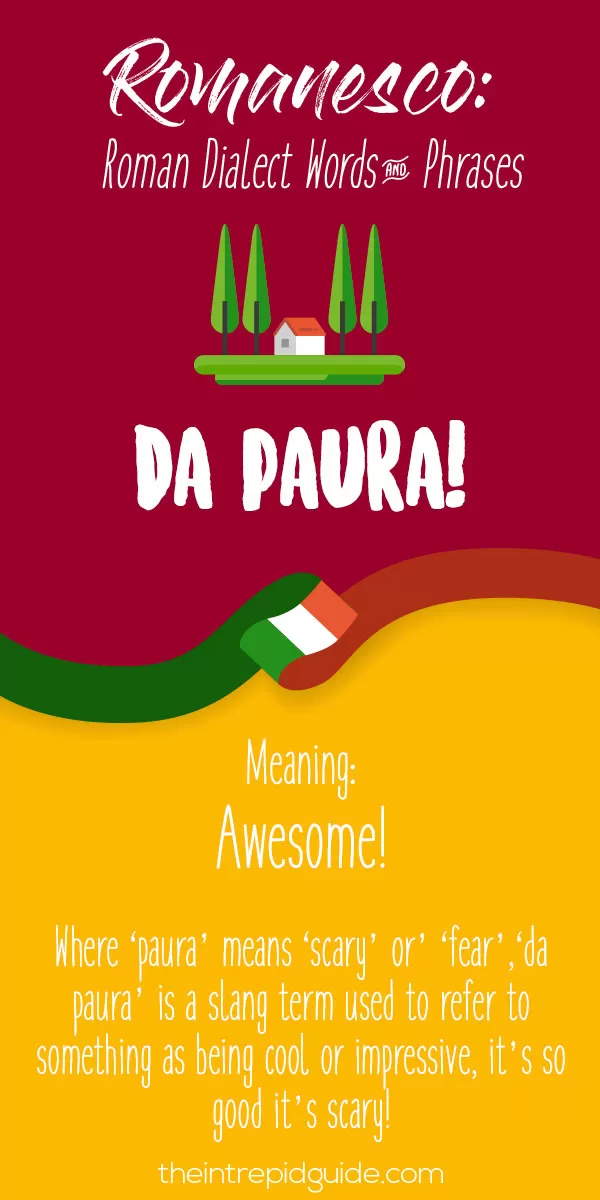 Much like ‘ammazza’ has a completely different meaning in Romanesco, so to does ‘paura’ which in standard Italian means fear and sounds nothing like a compliment. ‘Da paura’ is a slang term used to refer to something as being cool or impressive, it’s so good it’s scary!
Much like ‘ammazza’ has a completely different meaning in Romanesco, so to does ‘paura’ which in standard Italian means fear and sounds nothing like a compliment. ‘Da paura’ is a slang term used to refer to something as being cool or impressive, it’s so good it’s scary!
7. Scialla – Calm
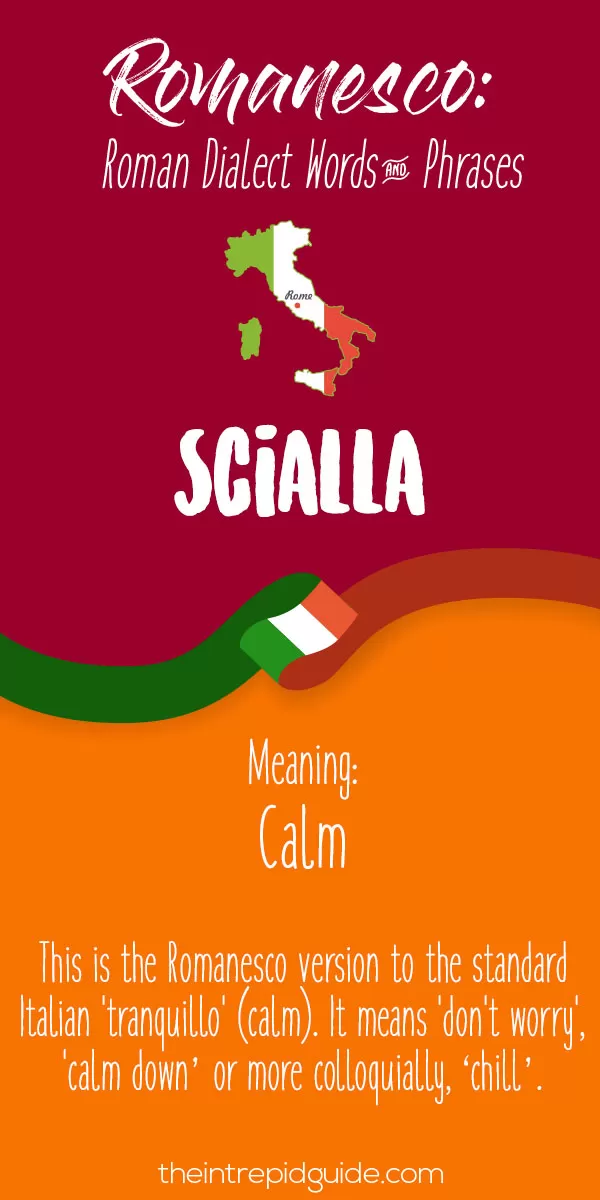 You’d be hard-pressed to go a day in Rome without hearing ‘scialla’. This is the Romanesco answer to the standard ‘tranquillo’ (calm). It just means ‘don’t worry’, ‘calm down’ or more colloquially, ‘chill’. It’s used when the person you’re talking to is getting all worked up.
You’d be hard-pressed to go a day in Rome without hearing ‘scialla’. This is the Romanesco answer to the standard ‘tranquillo’ (calm). It just means ‘don’t worry’, ‘calm down’ or more colloquially, ‘chill’. It’s used when the person you’re talking to is getting all worked up.
8. Anvedi! – Check it out!
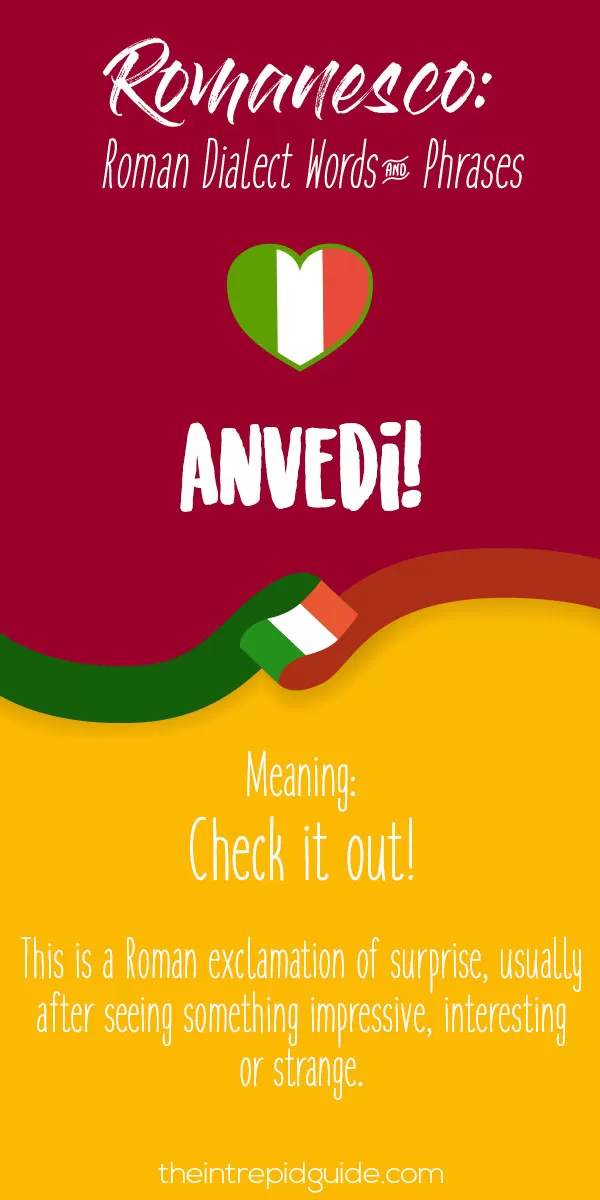 This is a Roman exclamation of surprise, usually after seeing something impressive, interesting or strange. For example, Anvedi come balla Marco! (Look how Marco is dancing!). ‘Anvedi’ is a corrupt more emphatic version of ‘vedi!.’
This is a Roman exclamation of surprise, usually after seeing something impressive, interesting or strange. For example, Anvedi come balla Marco! (Look how Marco is dancing!). ‘Anvedi’ is a corrupt more emphatic version of ‘vedi!.’
Want to learn Italian? Check out my book for absolute beginners which has received 5 stars on Amazon. Find out more about it here.
I must say that I was pleasantly surprised by the information in this book, and how useful it has been in making the next step to learning Italian. The chapter on “Italianising” English words is alone worth the 5 stars. I have been using free apps to this point, and they have been helpful, but the information in this book had moved me forward in my progress. I do recommend it, and would not have had I not thought it worth it. – Review on Amazon UK
Students loved the book so much that I even created an online travel Italian course. Learning Italian changed my life which you can read all about here and why I created this Italian language course that will transform your travels. Click here for more details and get instant access!
9. Abbiocco – Food coma
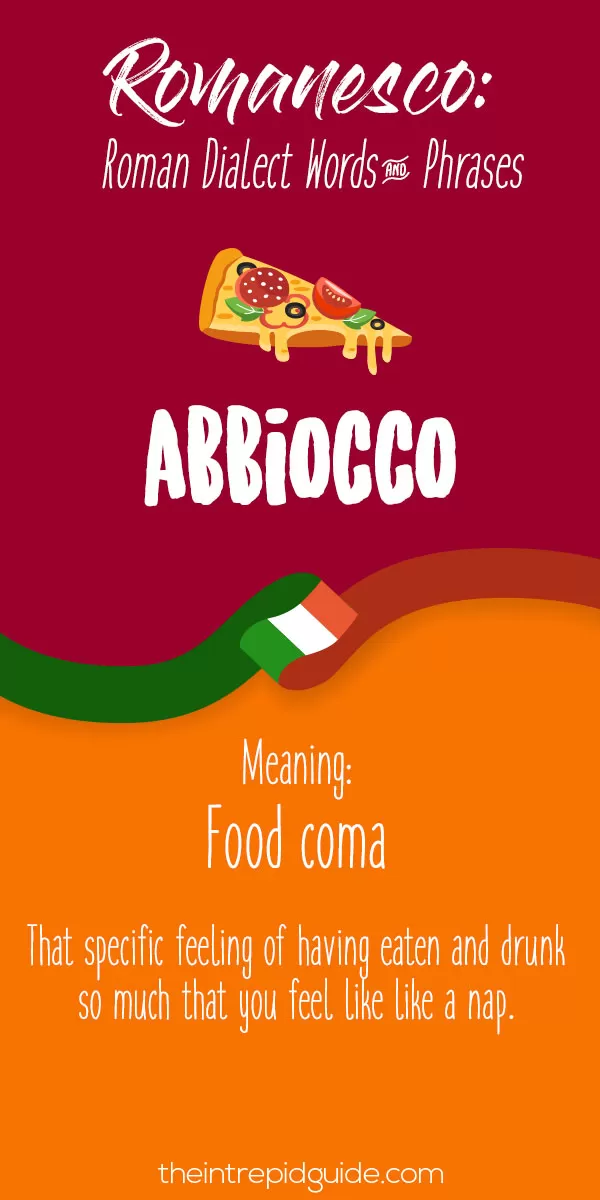 I learnt this one on a recent trip back to Rome. After a big bowl of Carbonara at lunch, my friend Roberto said ‘ho l’abbiocco’. While there’s no exact translation of ‘abbiocco’ in English, the closest thing would be to have a food coma. It refers to the specific feeling of having eaten and drunk so much that you feel like like a nap. In standard Italian you would say ‘essere preso da un colpo di sonno’, which doesn’t seem as word efficient.
I learnt this one on a recent trip back to Rome. After a big bowl of Carbonara at lunch, my friend Roberto said ‘ho l’abbiocco’. While there’s no exact translation of ‘abbiocco’ in English, the closest thing would be to have a food coma. It refers to the specific feeling of having eaten and drunk so much that you feel like like a nap. In standard Italian you would say ‘essere preso da un colpo di sonno’, which doesn’t seem as word efficient.
10. Stai a rosicà?’ / rosicone – Jealous, envious
![]() While in standard Italian might say ‘sei invidioso/a?” (are you jealous?) in Romanesco it’s ‘stai a rosicà?’. The noun ‘rosicone’ is also used a lot but doesn’t really have an proper English translation other than maybe ‘green-eyed’.
While in standard Italian might say ‘sei invidioso/a?” (are you jealous?) in Romanesco it’s ‘stai a rosicà?’. The noun ‘rosicone’ is also used a lot but doesn’t really have an proper English translation other than maybe ‘green-eyed’.
11. Mica pizza e fichi – No small feat
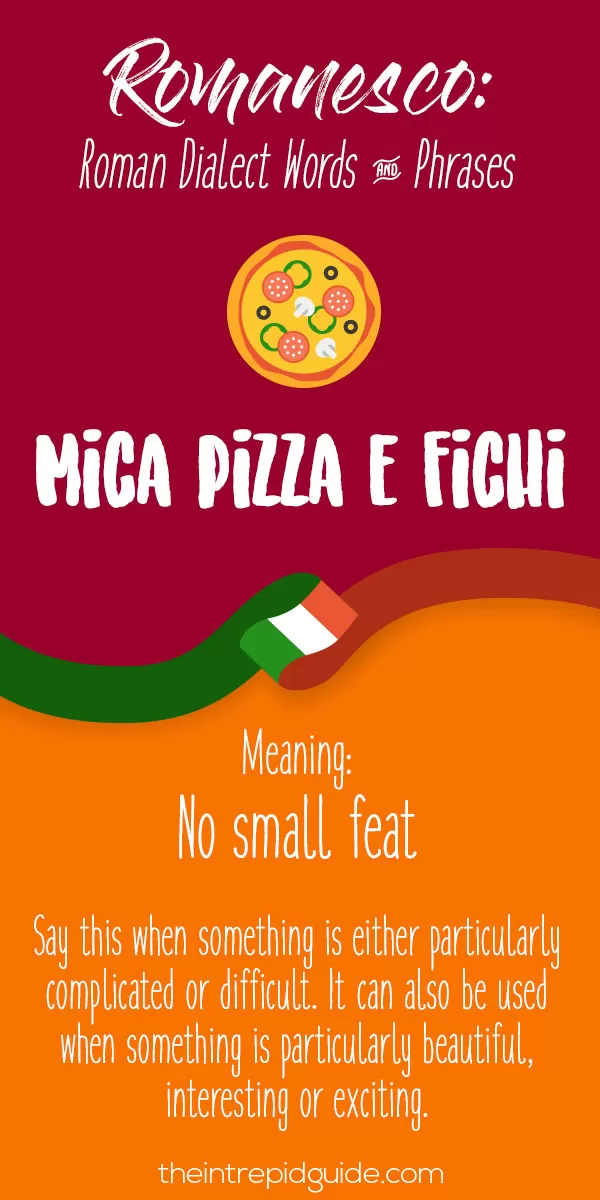 The literal translation of “mica pizza e fichi” is “not even pizza and figs” and comes with a bit of a backstory which I’ll get to. When something is either particularly complicated or difficult you can say “mica pizza e fichi!” to mean that it was no small feat. So why pizza and figs? Well, pizza is generally considered a relatively cheap dish accessible to anyone. Likewise with figs, you don’t need to buy them since they can usually be eaten directly from trees and are generally difficult to find in shops since they crush so easily. Together, these two foods indicate a meal for the poor but by negating this with the word ‘mica’ (not) in front, it means the complete opposite. We’re literally saying “it’s not poor at all” and “it’s not something that everyone can afford”.
The literal translation of “mica pizza e fichi” is “not even pizza and figs” and comes with a bit of a backstory which I’ll get to. When something is either particularly complicated or difficult you can say “mica pizza e fichi!” to mean that it was no small feat. So why pizza and figs? Well, pizza is generally considered a relatively cheap dish accessible to anyone. Likewise with figs, you don’t need to buy them since they can usually be eaten directly from trees and are generally difficult to find in shops since they crush so easily. Together, these two foods indicate a meal for the poor but by negating this with the word ‘mica’ (not) in front, it means the complete opposite. We’re literally saying “it’s not poor at all” and “it’s not something that everyone can afford”.
Having said that, it can also be used when something is particularly beautiful, interesting or exciting. You’ll know the difference from the speaker’s tone. Ti piace la fontana di Trevi? (Do you like the Trevi Fountain) “é bellissima, mica pizza e fichi!”
The singlur of fichi is fico, check out my guide on why you should NEVER mispronounce this Italian word.
12. ‘Na pennica – A nap
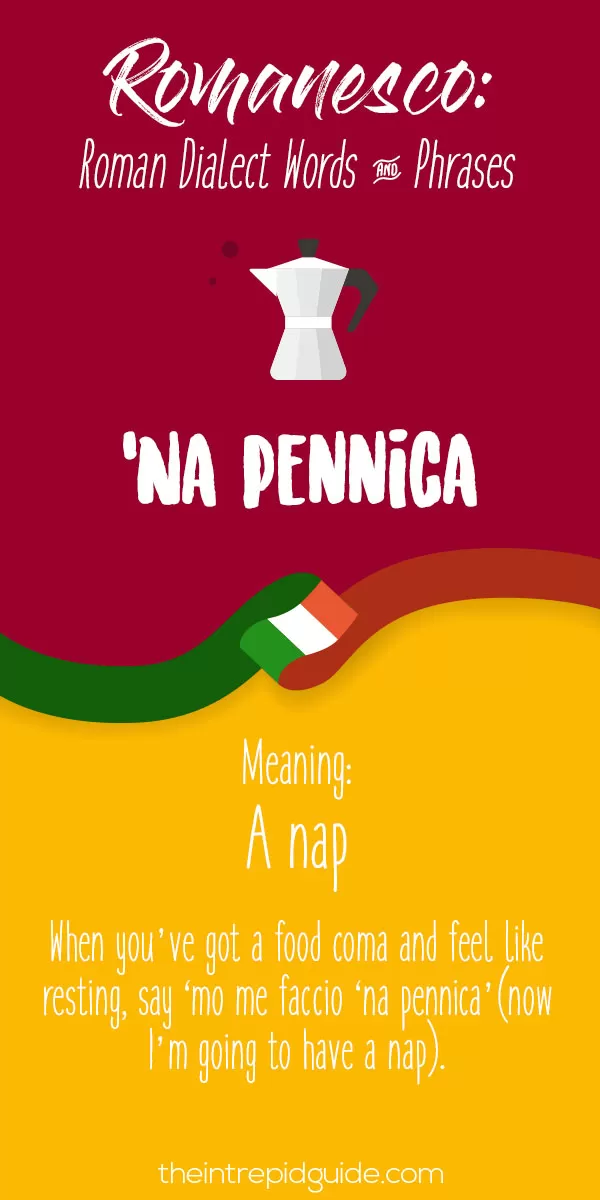 When you’ve got n’abbiocco (a food coma) and feel like resting, say mo me faccio ‘na pennica, now I’m going to have a nap.
When you’ve got n’abbiocco (a food coma) and feel like resting, say mo me faccio ‘na pennica, now I’m going to have a nap.
13. Mo s’è fatta ‘na certa – It’s quite late
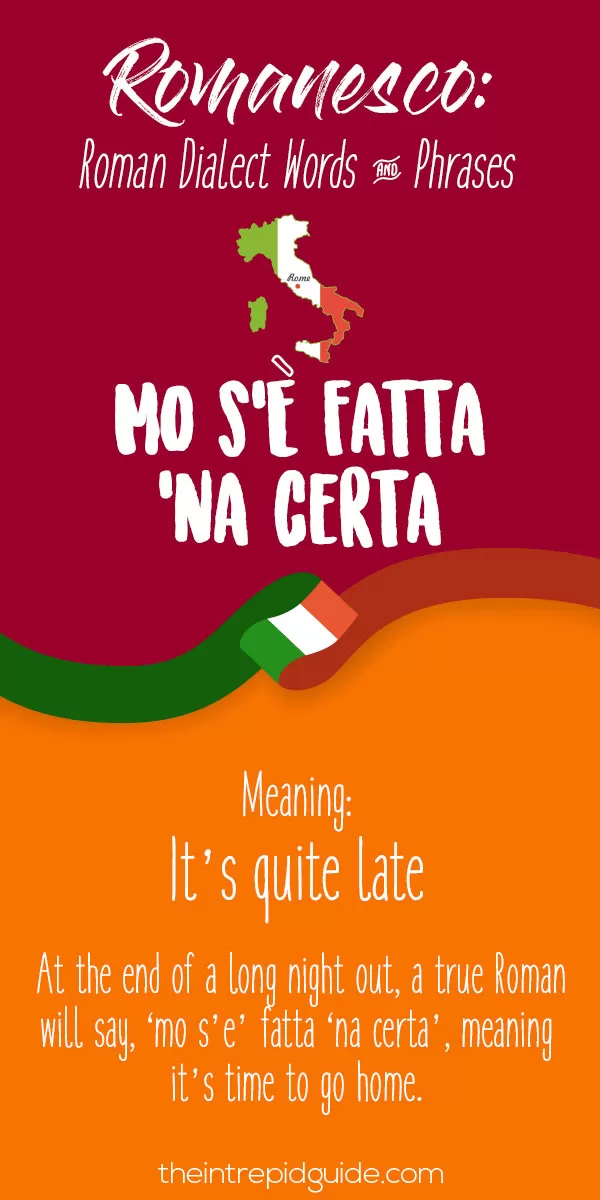 At the end of a long night out, a true Roman will say, “mo s’è fatta ‘na certa”, meaning it’s time to go home.
At the end of a long night out, a true Roman will say, “mo s’è fatta ‘na certa”, meaning it’s time to go home.
14. Sto ‘a schiumà! – I’m foaming (from the heat)
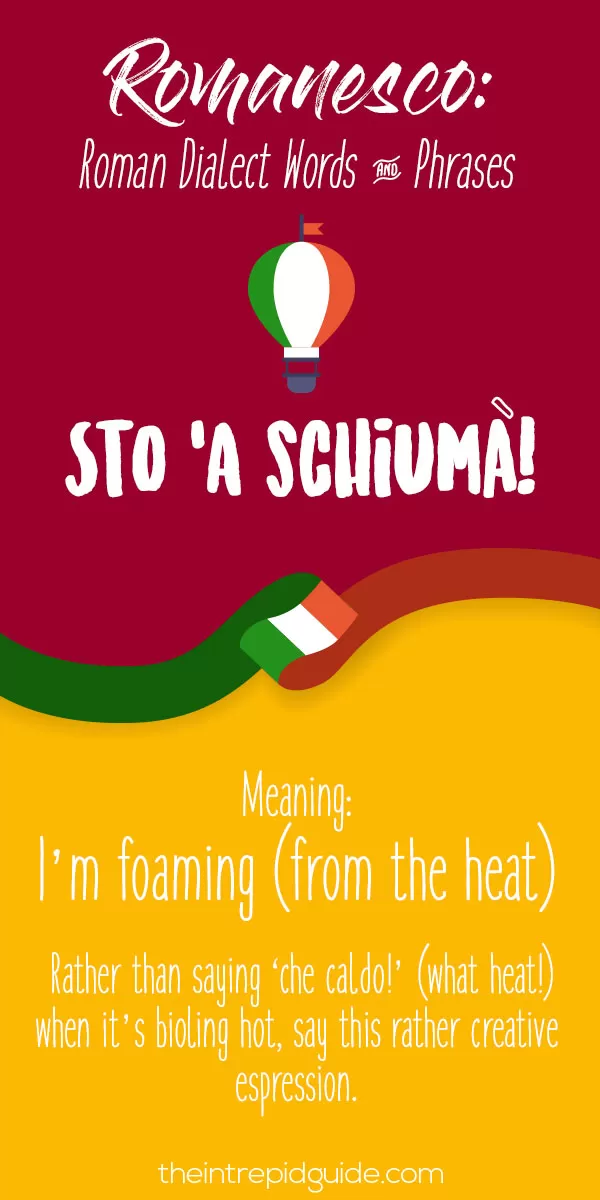 Rome gets crazy hot, especially in August, which is why most Romans are nowhere to found in the city.t
Rome gets crazy hot, especially in August, which is why most Romans are nowhere to found in the city.t
15. Stai manzo – Chill, relax, don’t worry
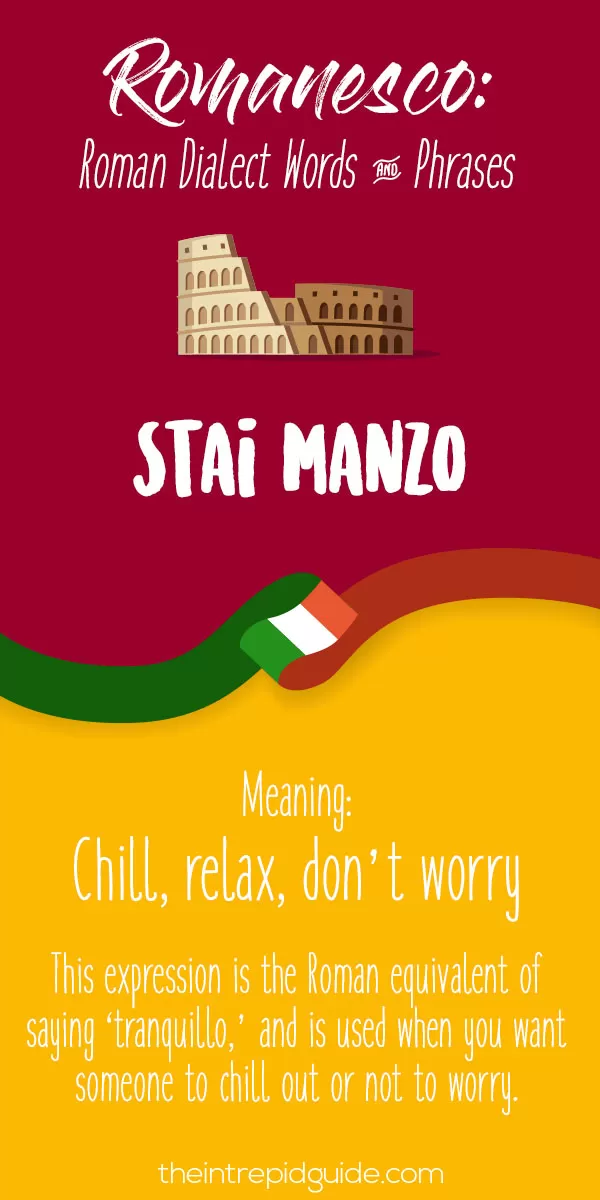 Not to be taken literally, (manzo means a steer, or young cow, stai manzo’) ‘stai manzo’ is the Roman equivalent of saying ‘tranquillo,’ and is used when you want someone to chill out or not to worry.
Not to be taken literally, (manzo means a steer, or young cow, stai manzo’) ‘stai manzo’ is the Roman equivalent of saying ‘tranquillo,’ and is used when you want someone to chill out or not to worry.
16. C ho n’ arsura! – I need a drink
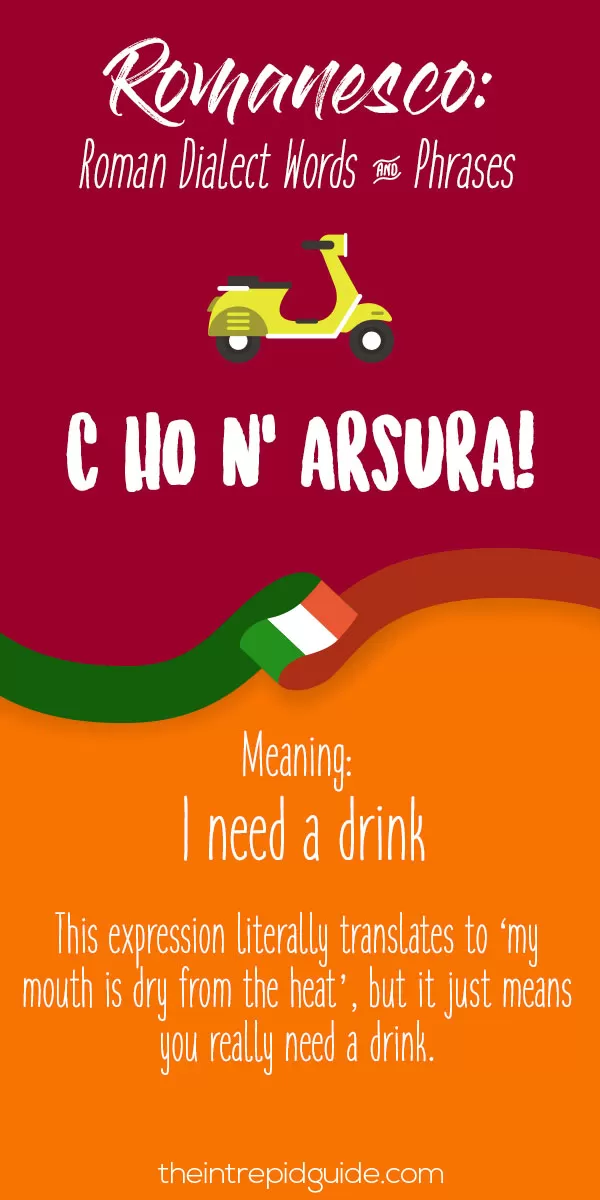 All that heat in Rome will make you thirsty, in which case you would say ’c ho n’ arsura!’ literally translating to ‘my mouth is dry from the heat’, but it just means you really need a drink.
All that heat in Rome will make you thirsty, in which case you would say ’c ho n’ arsura!’ literally translating to ‘my mouth is dry from the heat’, but it just means you really need a drink.
17. Tajarsi / Che tajo!’ / mi so’ tajato – To have fun
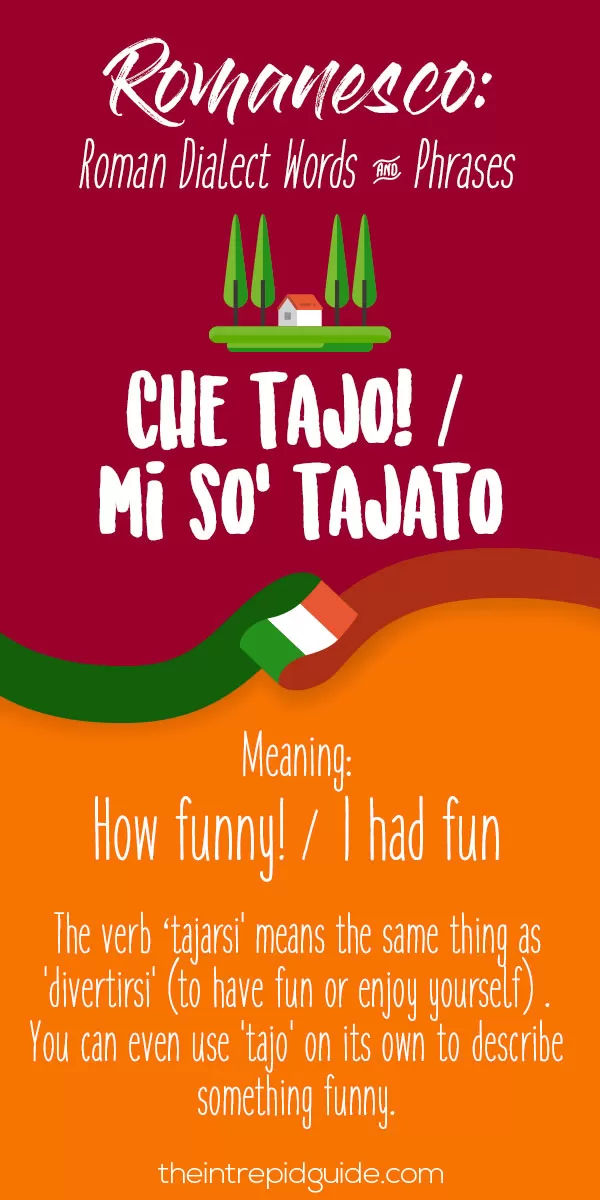 ‘Tajarsi’ means the same thing as ‘divertirsi’ (to have fun or enjoy yourself) So, ‘mi sono tajato’ (or ‘mi so’ tajato’) means ‘I had fun’.
‘Tajarsi’ means the same thing as ‘divertirsi’ (to have fun or enjoy yourself) So, ‘mi sono tajato’ (or ‘mi so’ tajato’) means ‘I had fun’.
You can even use ‘tajo’ on its own to describe something funny. If someone makes you laugh, exclaim ‘che tajo!” It means how funny. The equivalent in standard Italian is ‘che divertente!.’ You can even call someone ‘tajo’ or use it with sarcasm.
18. Pariolino – Snob, poser
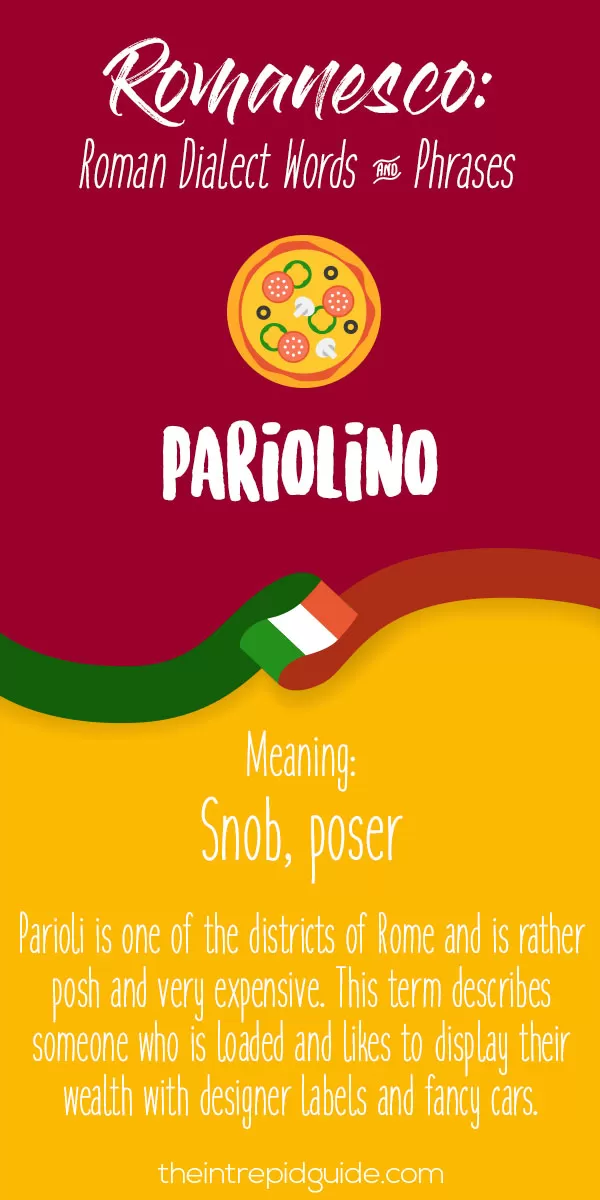 Parioli is one of the districts of Rome and is rather posh and very expensive. This term describes someone who ist loaded and likes to display their wealth with designer labels and fancy cars. You would call someone a ‘pariolino’ if they buy things just because they’re the latest trend.
Parioli is one of the districts of Rome and is rather posh and very expensive. This term describes someone who ist loaded and likes to display their wealth with designer labels and fancy cars. You would call someone a ‘pariolino’ if they buy things just because they’re the latest trend.
19. Mortacci tua / ‘tacci tua – Your ancestors
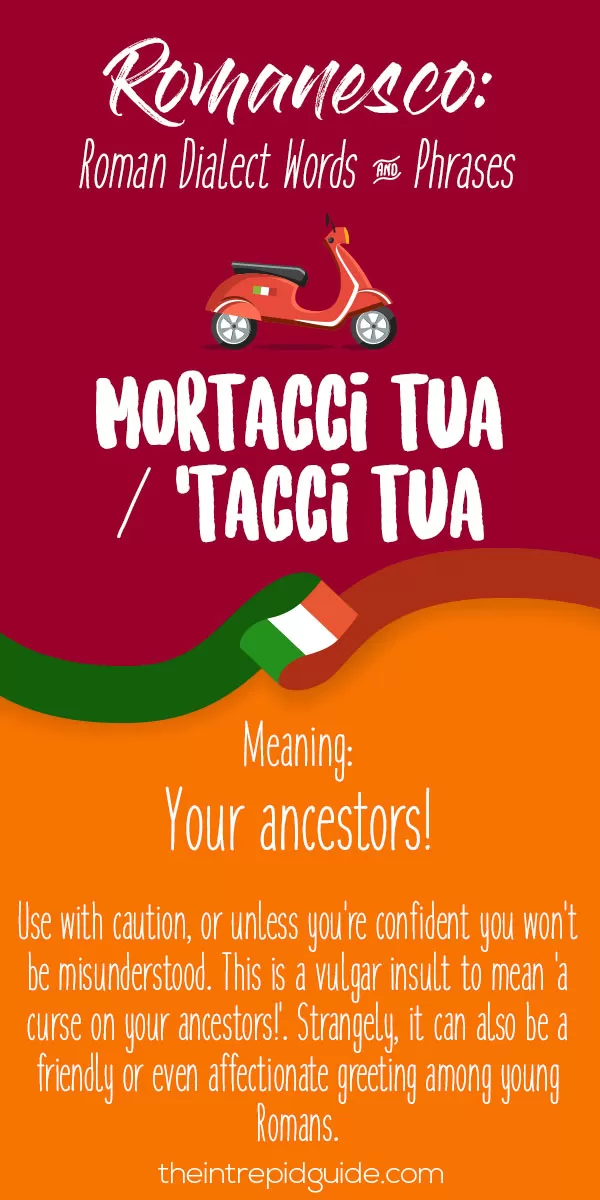 This is the only phrase in this list which comes with a cautionary warning. It has various meanings all of which are highly offensive, so it’s best to avoid using it unless you’re confident you won’t be misunderstood.
This is the only phrase in this list which comes with a cautionary warning. It has various meanings all of which are highly offensive, so it’s best to avoid using it unless you’re confident you won’t be misunderstood.
‘Tacci” is the shortened form of “mortacci” (ancestors) and is generally used as a vulgar insult to mean ‘a curse on your ancestors!’. Strangely, it can also be a friendly or even affectionate greeting among young Romans.
20. Annamo / ‘Nnamo – Come on, let’s go
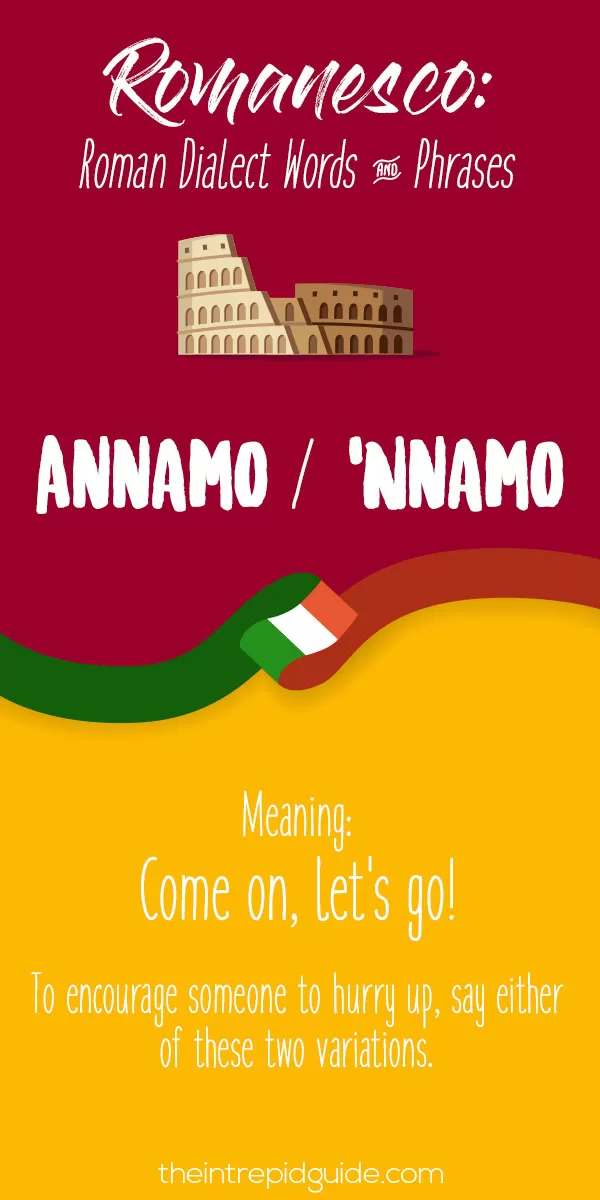 I love this one. I’ve used it countless times in jest around my Roman friends because it makes them giggle to hear an Aussie say it. When said, it’s usually very drawn out to add emphasis.
I love this one. I’ve used it countless times in jest around my Roman friends because it makes them giggle to hear an Aussie say it. When said, it’s usually very drawn out to add emphasis.
21. Eccallà! – I told you so!
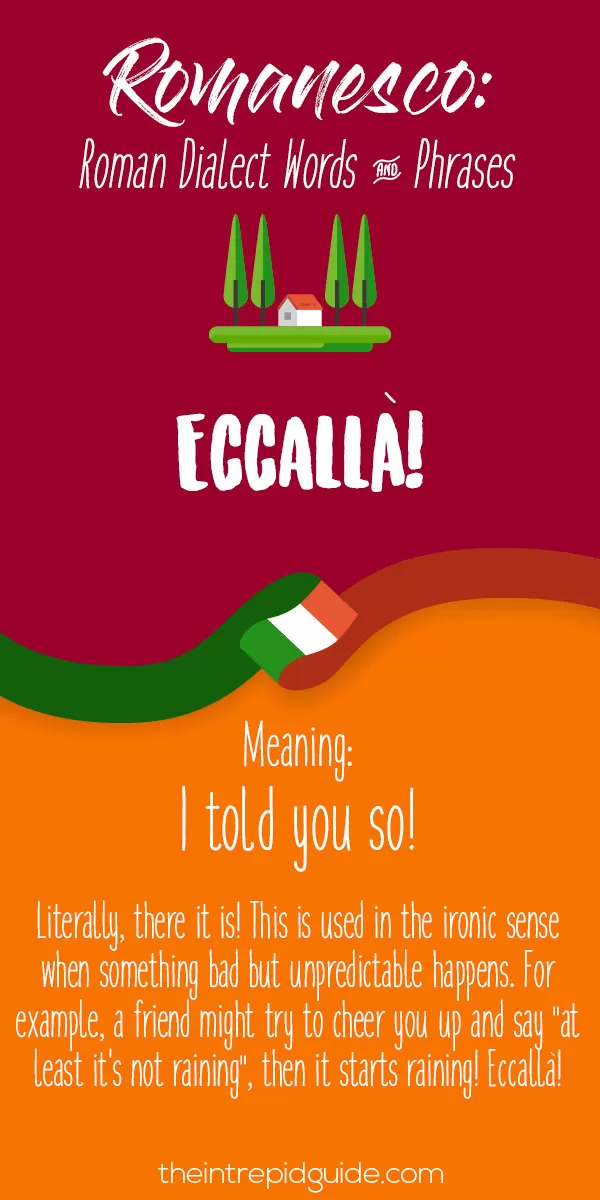 Literally, there it is! This is used in the ironic sense when something bad but unpredictable happens. For example, a friend might try to cheer you up and say “at least it’s not raining”, then it starts raining! Eccallà!
Literally, there it is! This is used in the ironic sense when something bad but unpredictable happens. For example, a friend might try to cheer you up and say “at least it’s not raining”, then it starts raining! Eccallà!
22. Sti cazzi! – I don’t give a sh*t
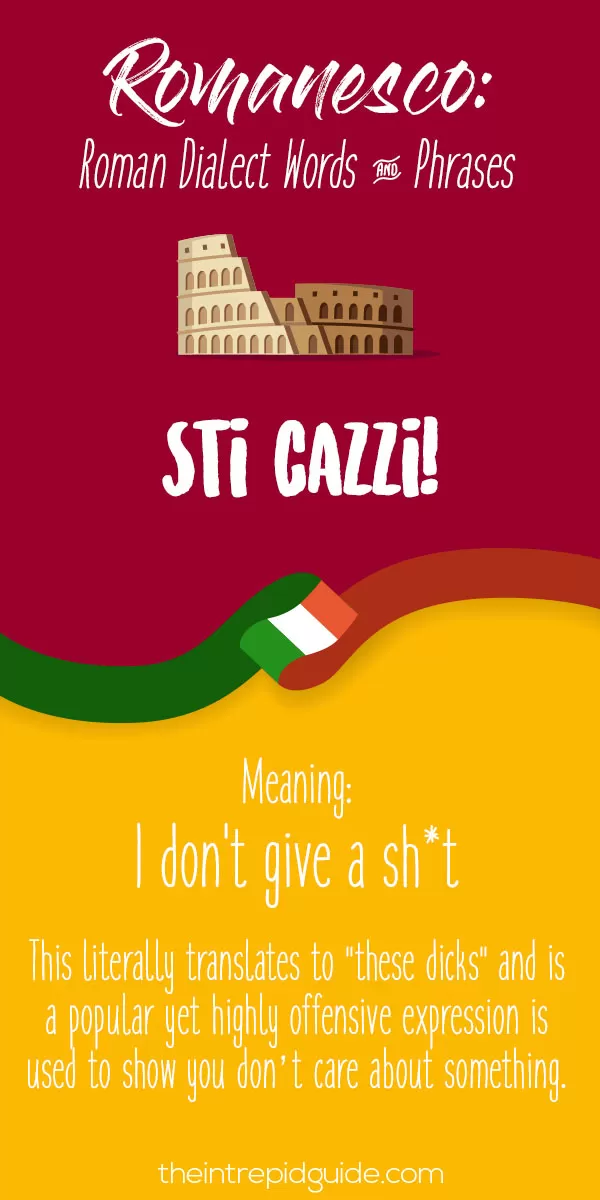 This literally translates to “these dicks” and is a popular yet highly offensive expression is used to show you don’t care about something.
This literally translates to “these dicks” and is a popular yet highly offensive expression is used to show you don’t care about something.
23. Annamo bene! – Seriously?!
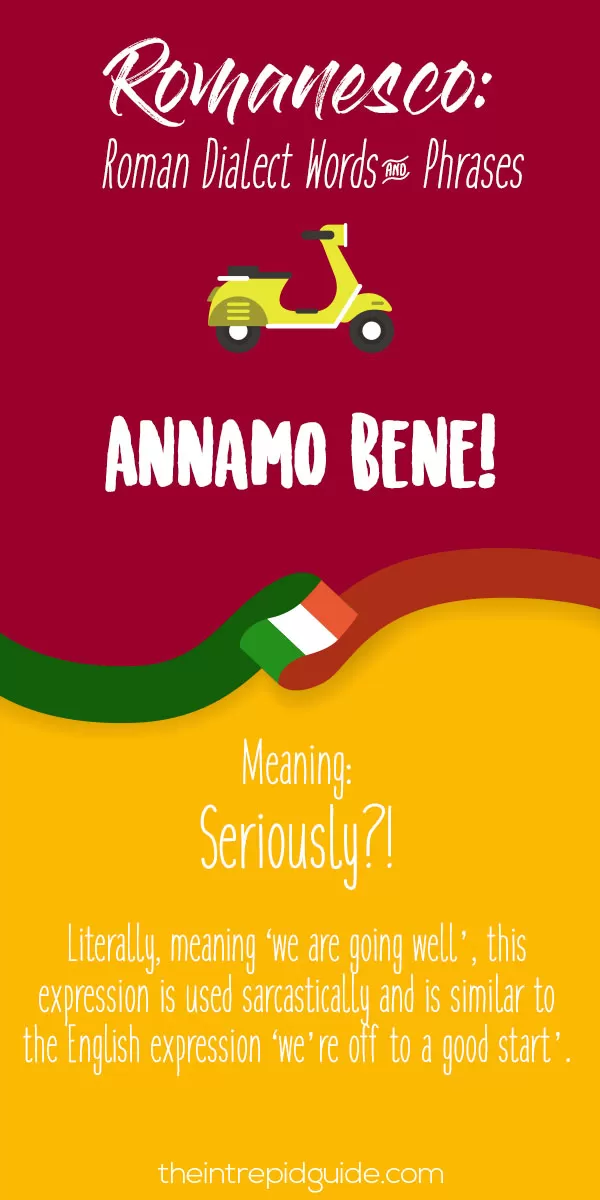 Literally, meaning “we are going well”, this expression is used sarcastically and is similar to the English expression “we’re off to a good start”.
Literally, meaning “we are going well”, this expression is used sarcastically and is similar to the English expression “we’re off to a good start”.
24. Na cifra! – a lot
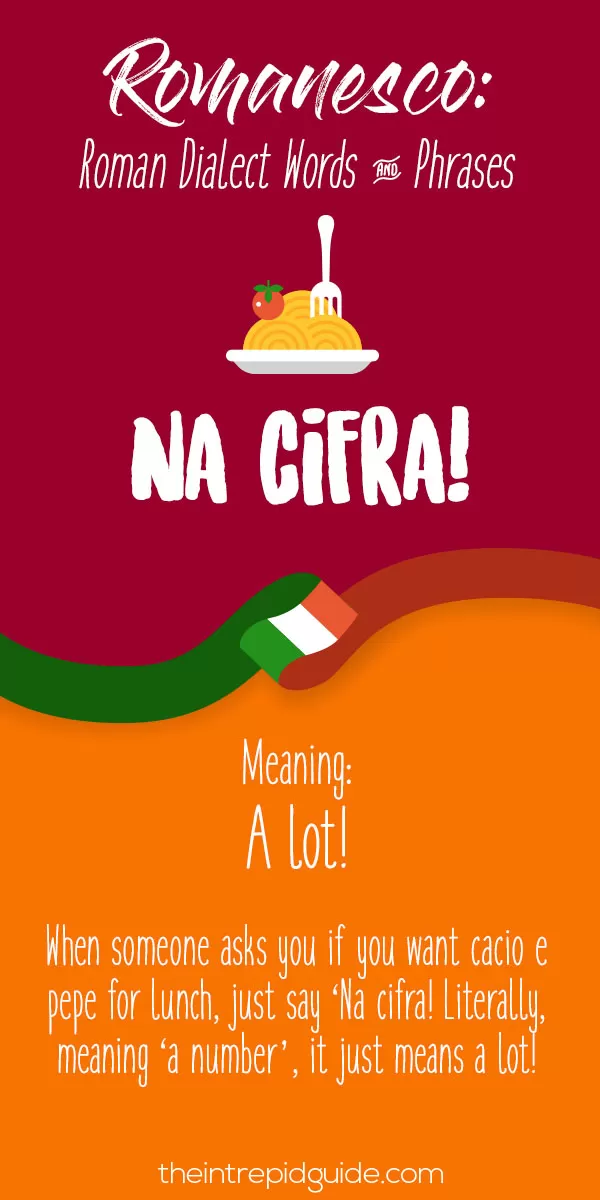 When someone asks you if you want cacio e pepe for lunch, just say ‘Na cifra! Literally, meaning “a number”, it just means a lot!
When someone asks you if you want cacio e pepe for lunch, just say ‘Na cifra! Literally, meaning “a number”, it just means a lot!
25. Ciaone! – No way! You’ve got to be kidding!
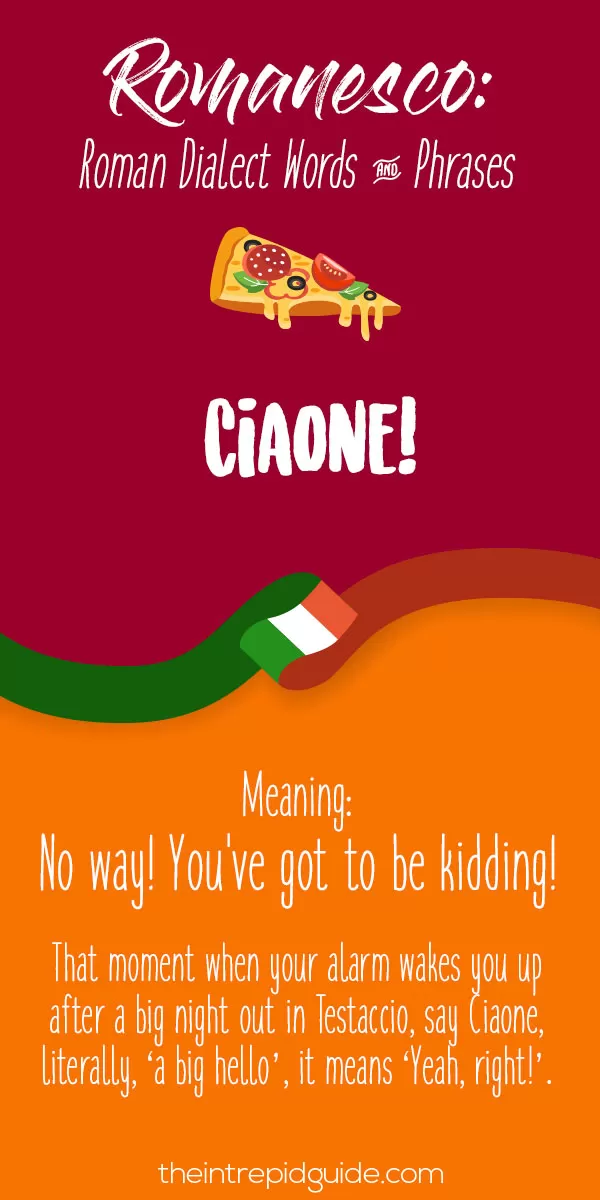 That moment when your alarm wakes you up after a big night out in Testaccio, say Ciaone, literally, “a big hello”, it means “Yeah, right!” or “You’ve got to be kidding”.
That moment when your alarm wakes you up after a big night out in Testaccio, say Ciaone, literally, “a big hello”, it means “Yeah, right!” or “You’ve got to be kidding”.
Want to learn more Roman expressions? I highly recommend this fabulous book written by a Roman. It includes even more common Roman idiomatic expressions plus examples of how and when to use them. This beautifully designed book makes it a lovely gift for yourself or someone who loves Rome.
Learn Italian with me, The Intrepid Guide!
Travelling to Italy? Don’t be treated like a tourist! Live your best travel experiences and learn Italian for less than the cost of eating at a tourist trap restaurant or a taxi driver who has “taken you for a ride”. In addition to my free Italian travel phrase guides, I’ve made it even easier for you to master the Italian language so you can create lifelong memories as you mingle with locals, get local tips, avoid tourist traps, and make new friends. Who knows you, you maybe even be invited over for afternoon tea by a lovely Sicilian family, like I was! Read all about how speaking Italian changed my life and check out The Intrepid Guide Languages courses here.
Here’s what my students are saying:

I really enjoyed the Master Italian for Travel FAST course, it certainly exceeded my expectations. The learning methodology is great, and easy to follow and found that I progressed much faster in the last 4 weeks than I ever did on my own or using other language apps. Grazie mille Michele, I can’t wait until I can put my new skills into action! – Roma Small
Click here for instant access!
Heading to Italy? Download my free Italian Travel Phrase guide here.
Learning Italian? Check out these Italian language guides
- How to Conjugate Italian Verbs in 3 Simple Steps [Italian for Beginners]
- 125 Most Common Italian Phrases for Travel You’ll Ever Need [PLUS Printable]
- Master Days of the Week in Italian (7 Simple Memory Hacks)
- Italian Numbers: How to Count in Italian From 0 to 1 Billion (Audio & PDF Download)
- 41 Italian Greetings: How to Say ‘Hello’ in Italian Like a Local
- 15 Italian Words You Should NEVER Mispronounce [& How Not To]
- 11 Effective Hacks That’ll Help You Learn Italian So Much Faster
- Top 14 Italian Words You Should NEVER Say [& What to Use Instead]
- 20 Hilarious Everyday Italian Expressions You Should Use
- 10 Reasons Why Learning Italian Will Change Your Life
- How to Learn Italian Before Your Trip
- 10 Italian Expressions Italians Love Saying
- 10 Italian Phrases That Will Instantly Make You Sound more Italian
- Funny Italian Sayings: 26 Food-Related Insults You Won’t Forget
- 15 Romantic Italian Films That’ll Make You Love Italy Even More
- How to Master Common Italian Phrases for Travel (Like a Local!)
Like it? Pin it for later
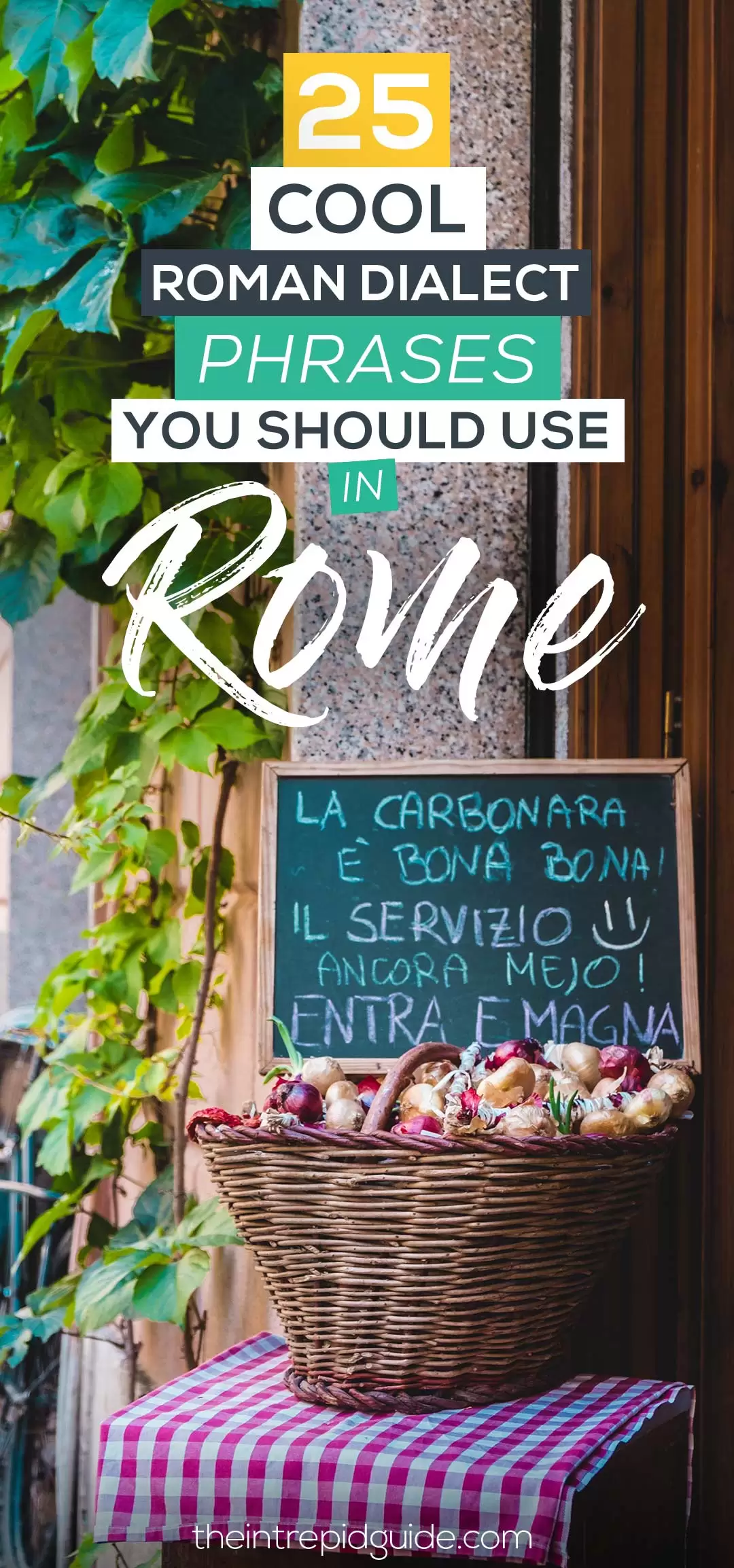
Over to you!
Do you speak Romanesco? What other phrases would you add? Tell me below!
Let me know using the comments section below or join me on social media to start a conversation.
Thanks for reading and I hope you enjoyed this post.
Like what you see? Subscribe using the form below to have all of my posts delivered directly to your email.

